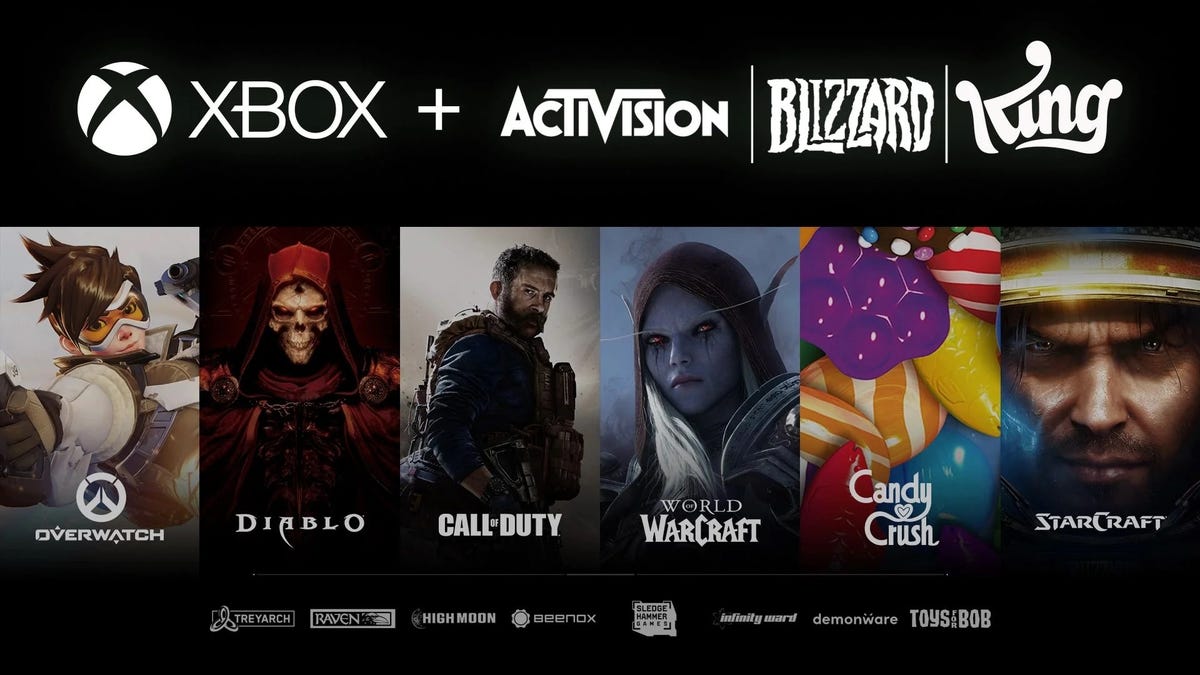The video game industry just got a lot smaller. The long and winding saga of Microsoft’s $69 billion purchase of Activision Blizzard has finally come to a close with the companies announcing the completed merger today following one last greenlight from regulators in the UK. Call of Duty is now part of Xbox and the tech giant has now surpassed Sony as the second biggest gaming company in the world, as gaming’s big march toward corporate consolidation continues.
In addition to the blockbuster military shooter, Activision Blizzard produces Overwatch 2, Diablo IV, and World of Warcraft. The acquisition will provide a raft of big games for Microsoft’s growing Xbox Game Pass subscription service, as well as make it a massive player on mobile with some of the biggest smartphone games in the world in Candy Crush and Call of Duty mobile. Microsoft signed a 10-year deal to keep Call of Duty on PlayStation, but has reserved the right to make other Activision Blizzard franchises exclusive to its Xbox platforms going forward.
The deal will also effectively expand Microsoft’s gaming business by roughly 10,000 employees. It’s not yet clear how many of them will remain, either due to redundancy layoffs or attrition of senior talent and executive level staff. Activision Blizzard CEO Bobby Kotick wrote in an email to staff today that he will stay on at the company reporting to Microsoft Gaming CEO Phil Spencer through the end of 2023.
Microsoft agreed to union neutrality with the Communication Workers of America last year, and starting 60 days from now Activision Blizzard employees will be able to get recognition of a union with majority support through a simple card check. Prior to joining Microsoft, the company had fought unionization efforts and recieved a number of labor complaints filed with the National Labor Relations Board.
Microsoft and Activision Blizzard first announced the groundbreaking merger back in January 2022. Filings with the Securities and Exchange Commission revealed that Spencer approached Kotick about the deal after the publisher’s stock price collapsed following major game delays and continued reports of past sexual harassment and misconduct by some of its employees.
A July 20, 2021 lawsuit by the California Civil Rights Department alleged widespread sexual harassment and discrimination within Activision Blizzard. Then a bombshell Wall Street Journal report on November 17, 2021 claimed that Kotick was aware of multiple past sexual misconduct lawsuits against the company but failed to report them to its board of directors. Activision has called the report misleading and is currently fighting the Civil Rights Department’s lawsuit in court.
However, a day after The Wall Street Journal’s report was published, Spencer emailed staff within Microsoft that he was “evaluating all aspects” of Xbox’s relationship with Activision Blizzard. The next day, he approached Kotick about buying the embattled company. Those talks eventually culminated in a deal to buy the Call of Duty publisher for $95 a share, a 45 percent premium over what the company was worth following the sexual misconduct reports and game production delays.
The Wall Street Journal and Bloomberg both reported at the time that Kotick was expected to resign after the deal closed, allowing him a graceful exit from the company he spent 30 years leading while the California lawsuit is still ongoing. Kotick also stands to make nearly $400 million from the sale via his stock holdings, over 20 times the $18 million settlement Activision Blizzard paid to the Equal Employment and Opportunity Commission over sexual discrimination allegations last year.
Microsoft and Activision Blizzard had originally planned to close the deal by last July, but battles with regulators in the UK and U.S. almost killed it off. The Federal Trade Commission attempted to block the merger in federal court over the summer, leading to a week-long trial that ended up revealing an unprecedented amount of behind-the-scenes info about Xbox, Sony, and other gaming companies, including leaked plans for upcoming consoles and private emails between top brass.
The FTC’s legal case ultimately failed, however, paving the way for Microsoft to address remaining reservations with the UK’s Competition and Markets Authority. As part of a reworked plan to win approval, Microsoft agreed to sell cloud gaming rights for Activision Blizzard games in the UK to Assassin’s Creed publisher Ubisoft, preventing it from being able to withhold streaming licenses for hits like Call of Duty and Overwatch from competitors like Sony. While Microsoft ultimately prevailed with regulators, the unexpected level of scrutiny resulted in a number of compromises and an unusual level of transparency that both companies may not have been counting on when the deal was first announced.
With the acquisition fights done, the new challenge for Microsoft will be how to integrate the massive publisher into its existing gaming business. That process will take years as well, and no doubt include its own set of twists and turns. Microsoft’s purchase of Bethesda Softworks’ parent company ZeniMax in 2020 doubled the size of Xbox Game Studios. Activision Blizzard is almost five times bigger. Its next big game, Call of Duty Modern Warfare 3 (Amazon), arrives on November 2, giving Microsoft the biggest release of the holiday season.


